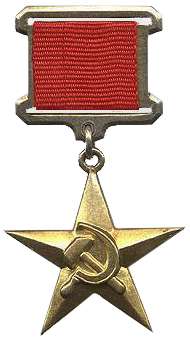Hero of Socialist Labour (USSR)
| Honorary Title Hero of Socialist Labour | |
|---|---|
|
Medal "Sickle and Hammer" of the Hero of Socialist Labour | |
|
Awarded by the | |
| Type | Honorary title |
| Eligibility | Soviet citizens |
| Awarded for | Exceptional achievements in national economy and culture |
| Status | Reintroduced as "Hero of Labour of the Russian Federation" |
| Statistics | |
| Established | December 27, 1938 |
| First awarded | December 20, 1939 |
| Last awarded | December 24, 1991 |
| Total awarded |
20,812
|
| Related | Hero of Labour of the Russian Federation |
Hero of Socialist Labour (Russian: Герой Социалистического Труда) was an honorary title of the Soviet Union and other Warsaw Pact countries. It was the highest degree of distinction for exceptional achievements in national economy and culture. It provided a similar status to the title Hero of the Soviet Union that was awarded for heroic deeds, but unlike the latter, was not awarded to foreign citizens.
Award History
The Honorary Title "Hero of Socialist Labour" was introduced by decree of the Presidium of the Supreme Soviet of the Soviet Union on December 27, 1938.[1]
Originally, Heroes of Socialist Labour were awarded the highest decoration of the Soviet Union, the Order of Lenin and a certificate from the Presidium of the Supreme Soviet of the Soviet Union.[1] In order to distinguish the Heroes of Socialist Labour from other Order of Lenin recipients, the "Hammer and Sickle" gold medal was introduced by decree of the Presidium on May 22, 1940,[2] to accompany the Order of Lenin and the certificate.
The first recipient of the award was Joseph Stalin, awarded by the Presidium of the Supreme Soviet in December 20, 1939. The second recipient of the award was the designer of machine guns Vasily Degtyaryov (2 January 1940). The third time (and the last before the onset of Operation Barbarossa) the award was issued to nine weapons designers, including Fedor Tokarev, Boris Shpitalny, Nikolai Polikarpov, Alexander Yakovlev and Vladimir Klimov. Post 1945 recipients include Mikhail Kalashnikov, Emilian Bukov, Alexander Tselikov, Dmitri Shostakovich, Nikolai Afanasiev, German Korobov and Peter Andreevich Tkachev.
By September 1, 1971, 16,245 people had been awarded the title of Hero of Socialist Labour (including 4,497 women). One hundred and five people (including 25 women) have been awarded two or more "Hammer and Sickle" medals. By 1991, at the dissolution of the Soviet Union, over 20,000 people had been awarded the title.
In April 2013, Vladimir Putin resurrected the award in Russia under the title "Hero of Labour".[3]
Award Statute
The Honorary Title "Hero of Socialist Labour" was awarded by the Presidium to citizens who made significant contributions to the advancement of Soviet industry, agriculture, transportation, trade, science and technology, or otherwise served as exemplary models of the Soviet worker.
Heroes of Socialist Labour who attained further exceptional achievements were awarded a second "Hammer and Sickle" medal and bronze busts of the Heroes were to be constructed in their home towns to mark the occasion.[2] Thrice Heroes of Socialist Labour were to have their busts placed near the planned Palace of Soviets, but this was never implemented as the Palace of Soviets was never built.
Only the Presidium of the Supreme Soviet of the Soviet Union could deprive a person of this title.[2] The insignia "Hero of Socialist Labour", like the "Hero of the Soviet Union" Gold Star Medal, is always worn in full on the left side of the chest and in the presence of other orders and medals, placed above them. If worn with honorary titles of the Russian Federation, the latter have precedence.[4]
Award Description
The Honorary Title "Hero of Socialist Labour" was designed by the artist A. Pomansky. The gold star medal of the Honorary Title "Hero of Socialist Labour" was a five-pointed star with smooth dihedral rays on the obverse, the diameter of the circumscribed star was 33.5 mm. In the center of the obverse, a relief hammer and sickle respectively of 14 and 13 mm. It weighed 15.25 grams.[2]
The reverse was plain and was surrounded by a slightly raised rim. In the center, the relief inscription "Hero of Socialist Labor" (Russian: "Герой Социалистического Труда") in 2mm high letters, the award serial number was inscribed just above in 1mm high numbers.[2]
The insignia was secured to a standard 25 X 15mm Soviet square mount by a ring through the suspension loop. The mount was covered by a red silk moiré ribbon. On the reverse of the mount was a threaded stub and nut to secure the award to clothing.[2]
See also
- List of people awarded the Hero of Socialist Labour
References
- 1 2 "Decree of the Presidium of the Supreme Soviet of the USSR of December 27, 1938" (in Russian). Legal Library of the USSR. 1938-12-27. Retrieved 2012-02-25.
- 1 2 3 4 5 6 "Decree of the Presidium of the Supreme Soviet of the USSR of May 22, 1940" (in Russian). Legal Library of the USSR. 1940-05-22. Retrieved 2012-02-25.
- ↑ "Russia seeks new generation of 'heroes'". BBC News. 1 May 2013.
- ↑ "Decree of the President of the Russian Federation of September 7, 2010 No 1099" (in Russian). Russian Gazette. 2010-09-07. Retrieved 2012-02-25.
- Oruzhie Magazine, Page 9, Issue 5 1998 & Issue 6 1998.
- "Солдат удачи" номер 9 (72) 2000 Д.Ширяев "Кто изобрел автомат Калашникова"
External links
- (Russian) History of the award
- (Russian) Legal Library of the USSR
